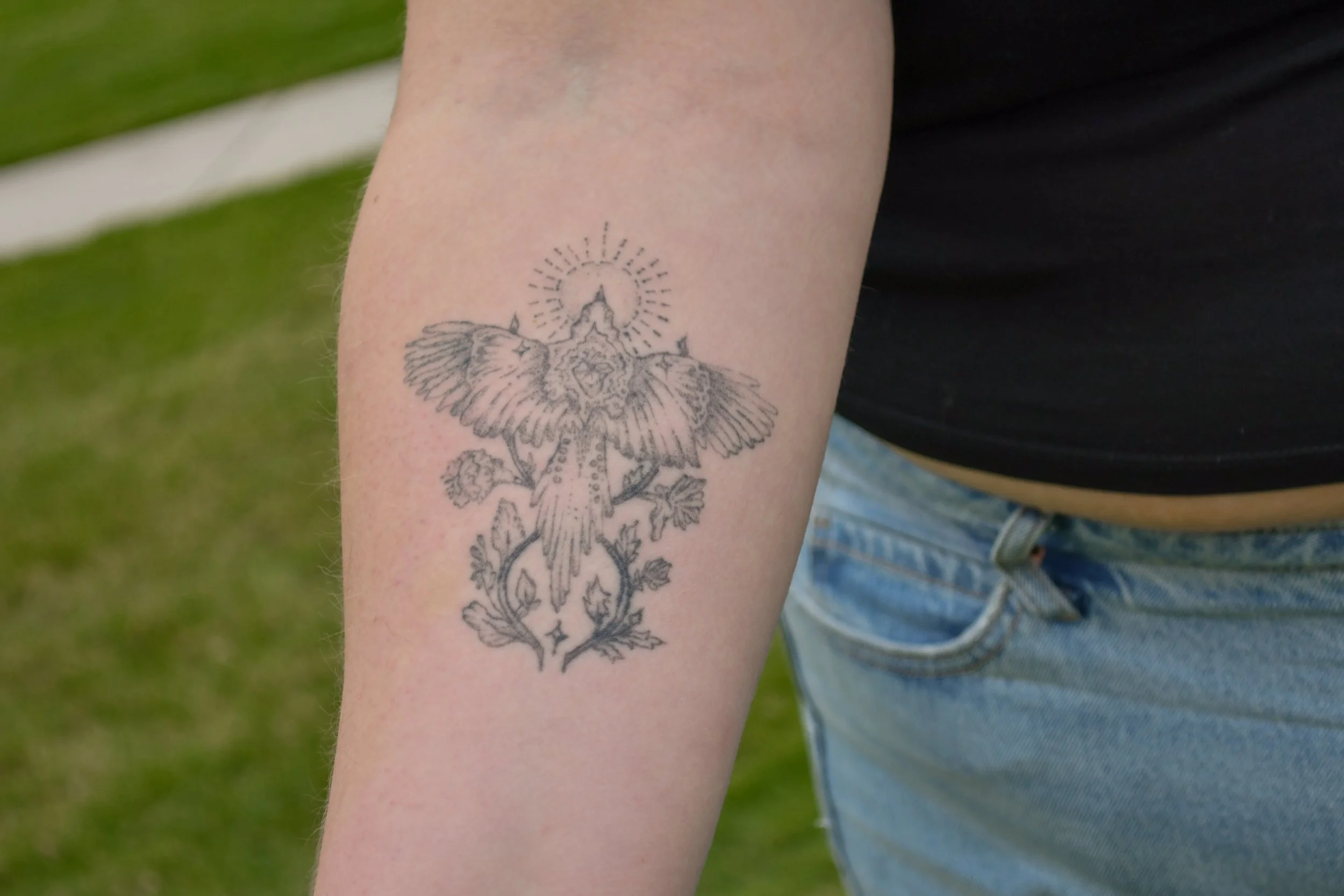Life is Hard, I Deserve a Sticker
Photos by Brynne Norton
Article by Lea Olivares Raudes
NEWBERG, Ore. - Originating from the word “tatau” in Polynesian, tattoos’ prevalence in history began as far back as ancient times. Their use and meaning is ever-evolving.
In Japan, intricate lines would be tattooed on individuals in the name of irezumi art to resemble spiritual power within pain and pride. In the west, sailors used images of anchors and sparrows to resemble survival, loss and luck.
Once worn by the rebels like bikers and punk rockers, tattoos signaled defiance from societal conformity. In the 21st century, tattoos are considered a form of art and self expression, whether it be a fine line tattoo of a salmon on your wrist or a cyber sigilism piece that covers your leg. In a world that feels like it’s changing daily, tattoos can serve as a reminder of permanence.
Millennials and Gen Z have adopted the idea that tattoos are about presence over permanence. The spontaneous nature of the modern tattoo is a branch of self identity, similar to the way you dress.
“There’s a little joke about life, like, ‘life is hard, I deserve stickers,’” said Chris Low, Senior Marketing Photographer for George Fox University (GFU). “Some people are like, ‘I want a sticker, I’ve got fifty bucks, and somebody who’s learning how to tattoo will do it for me.”
The idea of a “sticker” grew into a passion over time for Low. “I’ve never considered myself an artist but I’ve always enjoyed art,” he said. “The more I looked at [tattoos]…the more interested I became in it and it turned into a thing that I wanted to do.”
Millennials and Gen Z are open to impulsivity. “That’s a big difference between the people that are older than me and the people your age, your generation,” said Low. “I don’t think either is right or wrong. You do the thing that makes you feel the most comfortable with what you’re putting on your body forever.”
Low, who has been getting tattooed for decades, acknowledged the decision’s importance. “I think generations before me were super thoughtful about having to have meaning behind everything. And I think…your generation is a little bit more carefree about it,” he said.
The irony is that the intentionality behind getting a tattoo is combatted by the overall experience.“Getting tattooed is unique based on who’s doing it, what they're doing, and where they're doing it,” said Low. “You can plan as much as you want, but who knows what's going to happen.”
Whether you're spontaneous or sentimental, every person is influenced by their preceding generation. Respecting your elders gains new meaning when you realize soon you will be in their same position. This unique dynamic is highlighted through the personal relationship one has with tattoos and how one's views on getting inked can be changed by those close to you.
“My father-in-law says they are permanent solutions to temporary problems,” said Low. “He thinks he’s being funny when he says that because he doesn’t have any tattoos, but it’s true in a way. They are permanent things made for temporary thoughts.”
Low recognizes himself as a bridge of perspective from younger to older generations. “I’m careful with the tattoos I get, but I like tattoos, so I get tattoos,” he said. “I’m not going to go get a stick-and-poke of a broken skateboard from somebody who’s learning, but I’m also not going to not get something just because it doesn’t have deep meaning.”
This balance of intention and impulse defines the modern tattoo landscape. Some may relate to Low in the sense that not all ideas you get inked on your body have deep meaning.
For Brigitta Andreas, a senior at GFU, tattoos symbolize a personal awakening, one first shaped by faith then shifted by family and cultural acceptance. “When I was really little, I thought tattoos were so bad,” she said. “I was raised in a religious environment, so I was scared of them. I basically thought if you didn't have a religious tattoo or something that was really meaningful, it was kind of wrong to get one.”
Her perspective changed when her brother got his first tattoo. “He’s tatted up. Sleeves, neck tattoos, chest tattoos; he has everything,” she said. “Through my middle school years I started being like, ‘oh, tattoos are really cool.’ They make him look cool; they add to his outfits, and he seems like an interesting person because of them.”
This marked the beginning of her acceptance and appreciation for body art. “My first tattoo was super meaningful. It added to my outfits, it was a conversation starter and from there it snowballed,.” Andreas said.
Andreas began to view tattoos as playful and freeing, going against the grain of life's seriousness. “I think we take our lives really seriously,” she said. “When people say, ‘you’re gonna have saggy skin with that tattoo,’ I’m like, I’d rather my skin be saggy with a pretty picture on it than just looking weird and pale. I think self-expression is beautiful.”
Andreas saw this same shift in the people who were reluctant to the idea of getting inked. “I was met with a lot of animosity when I got my first tattoo five years ago. Now, those same parents from my high school who said, ‘you got a tattoo?’ are getting tattoos themselves,” she said.
Andrea’s carefree and sentimental ideas along with Low’s reflective caution highlight a strong conversation and connection between generations. It is through people like these that tattoos will weave into an accepting culture of upcoming generations.
Whether done with deep intent or on a whim in your friend's bedroom, tattoos resemble the stories of people in a subtle yet powerful way. If you ever wind up in a tattoo parlor, let their permanence be a reminder to your true self.

